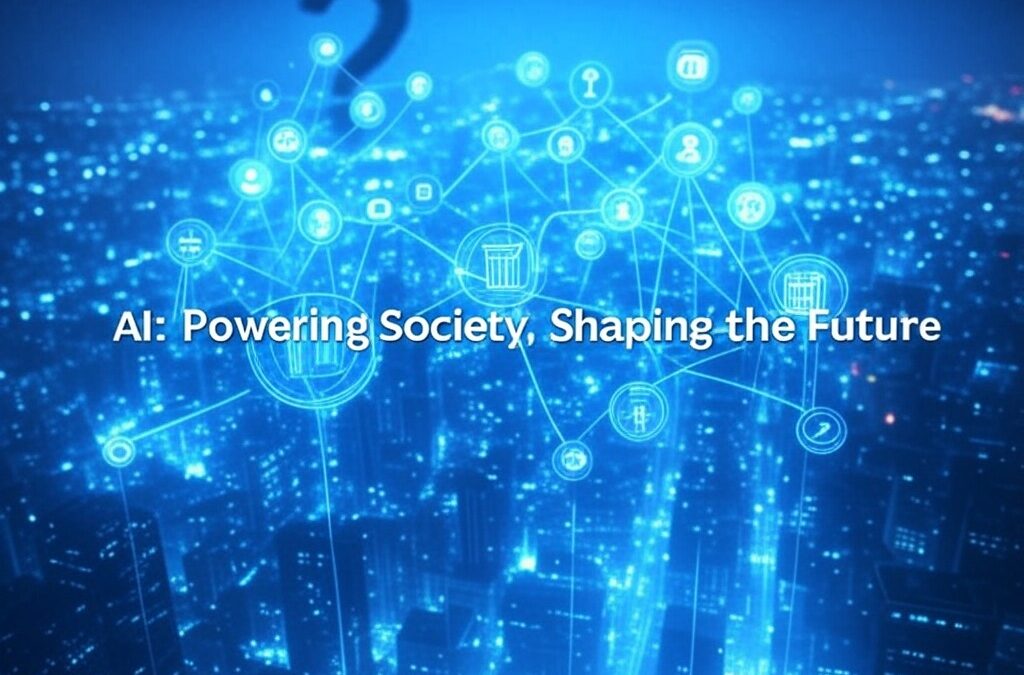Impact of AI Technology on Society and Economy
Introduction
Artificial Intelligence (AI) is a transformative force reshaping society and the economy in unprecedented ways. As a General Purpose Technology (GPT), AI integrates with computing, energy, and data systems, driving exponential advancements across industries (Brynjolfsson and McAfee, 2017). From personalized consumer experiences to optimized manufacturing, AI’s influence permeates daily life and global markets. Its rapid evolution, fueled by declining computational costs and interconnected networks, accelerates innovation and creates both opportunities and challenges. This report explores AI’s multifaceted impact, examining its effects on wealth, jobs, human life, and institutional frameworks. By analyzing its strengths, costs, and societal implications, we aim to provide a comprehensive understanding of AI’s role in shaping the future.
Definition
AI refers to systems capable of performing tasks that typically require human intelligence, such as learning, reasoning, and decision-making. It encompasses machine learning, natural language processing, and computer vision, enabling applications from autonomous vehicles to predictive analytics (Russell and Norvig, 2021). AI’s core strength lies in its ability to process vast datasets, identify patterns, and optimize outcomes, making it a cornerstone of modern technological revolutions.
Strengths of AI Adoption
AI’s strengths include its scalability, adaptability, and efficiency. It processes massive datasets quickly, enabling real-time analytics and personalized services. Machine learning models improve iteratively, enhancing accuracy over time (Goodfellow et al., 2016). AI also reduces human error in tasks like medical diagnostics and supply chain management. Furthermore, AI complements technologies like IoT and blockchain, creating synergies. For instance, AI enhances IoT by analyzing sensor data for predictive maintenance, while blockchain ensures secure AI transactions (Panarello et al., 2018). These integrations amplify AI’s impact across sectors.
People value AI’s ability to deliver personalized experiences, such as tailored recommendations on streaming platforms and efficient virtual assistants (Varian, 2018). Its convenience, speed, and accessibility make daily tasks seamless, fostering widespread adoption. Numerous businesses are creating novel ways to use AI to enhance productivity, which in turn is enabling new business models. The global GDP is projected to increase by 14% by 2030 due to the adoption of AI (PwC, 2017). Other areas AI enhances include human life by improving healthcare, education, and convenience. AI-driven diagnostics increase accuracy in disease detection, while personalized learning platforms cater to individual needs (Topol, 2019).
Challenges of AI Adoption
While AI is driving significant economic growth through automation and data-driven decision-making, its adoption presents significant ethical dilemmas and societal impacts that require proactive governance (Crawford, 2021). These challenges include job displacement, privacy concerns, diminished critical thinking and social interaction, AI-generated misinformation or cyberattacks, bias in algorithms, and environmental impacts.
It is well documented that widespread technology adoption exacerbates wealth inequality, as benefits tend to concentrate among tech businesses and skilled workers. Technological advancements typically create high-skill jobs while displacing low-skill workers, necessitating reskilling across society and widening individual income disparities (Frey and Osborne, 2017; Autor et al., 2020).
Furthermore, given that developing AI systems requires significant investment in hardware and talent (Bughin et al., 2018), global tech firms and nations are racing for dominance. As a direct result, adversarial actions, like AI-generated misinformation or cyberattacks, are on the rise, posing significant risks to the general population, an issue not seen even in historical military conflicts (Brundage et al., 2018). Another central area of concern revolves around the ethics of AI use, especially given that most algorithms have bias embedded in them, reflecting the bias of their creators (Bivens, 2017).
Governments worldwide are recognizing these challenges and supporting AI through funding, policies, and ethical guidelines. For example, the EU’s AI Act and U.S. investments in AI research (European Commission, 2021) are not only supporting AI development with research funding but also shaping it. However, regulatory fragmentation risks stifling innovation or creating arbitrage opportunities.
Conclusion
AI is a cornerstone of the 21st-century technological revolution, driving economic growth, enhancing human life, and reshaping industries. Its strengths—scalability, efficiency, and adaptability—make it indispensable, yet challenges like job displacement, ethical concerns, and wealth inequality demand attention. Governments and institutions are critical in fostering AI’s potential through supportive policies and ethical frameworks. Complementary technologies like IoT and blockchain amplify AI’s impact, ensuring longevity. However, high costs and adversarial risks, such as misinformation, require proactive mitigation. To maximize benefits, stakeholders must prioritize reskilling, equitable access, and sustainable practices. AI’s transformative power offers immense opportunities, but its responsible societal integration will determine its ultimate legacy. Future research should focus on balancing innovation with ethical governance to ensure AI serves humanity equitably.
Keywords: #AI #ArtificialIntelligence #TechRevolution #FutureOfWork #Innovation

